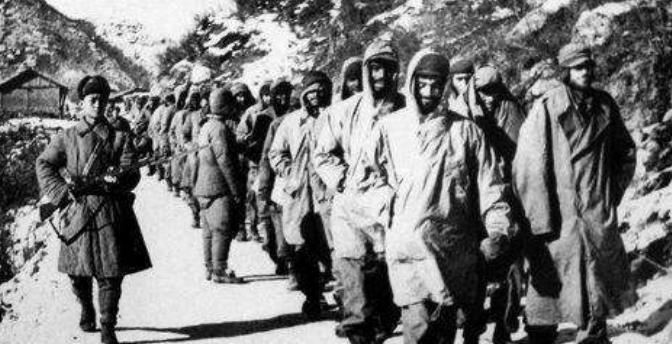U.S.-Korea War Veteran: Released enemy prisoners, and almost became a prisoner himself
As is known to all, after the Japanese invading army captured Nanjing, the opponents of unarmed prisoners of war swept with machine guns, stabbed with bayonets, and brutally killed. On the Korean battlefield, there is no shortage of cases of killing and mistreatment of prisoners of war by the so-called "United Nations Forces".

On May 28, 1951, Liu Chunrong, the squad leader of the 540th Regiment of the 180th Division, witnessed the enemy killing the captured members of our army. After he was injured, he was lying in the division bandage waiting for his transfer. Suddenly, the enemy rushed in with guns and fired wildly at the wounded lying on the bed. 280 wounded volunteers were killed. He was shot twice and did not die, becoming a witness to the atrocity.
Our army fully embodies the humanitarian spirit towards prisoners of war.
The 180th Division was about to break through, and the prisoners of war could not be taken away.
Chen Zijie, deputy chief of the division's enemy engineering section, was responsible for releasing a group of prisoners of war. After five campaigns, Comrade Chen Zijie was transferred to the Propaganda Section of the Military Political Department as an officer, and I worked with him for two or three years and listened to him talk about the release of prisoners of war.
Chen Zijie went to the division command post and accepted the task of releasing prisoners of war. He brought an enemy engineer officer, an English translator, a Korean translator, and a guard squad, and in a mountain valley, received a group of American prisoners from the captivity office by Officer He Shixiong of the Military Propaganda Department. They were American soldiers captured in the Battle of Chosin Lake in the Second Campaign, and they were educated and had a certain understanding of the war of aggression. Chen Zijie saw these people, very tall, with a long beard, and their ages were around 20 years old. Chen Zijie spoke to them, publicized our army's policy of taking prisoners, and decided to release them. Bring them to the front line and get them back to their troops.
Chen Zijie spoke sentence by sentence, and the English translation translated sentence by sentence. The prisoners of war listened to the speech and looked happy. For the safety of the prisoners of war, who were not killed by American planes and artillery on the road, they rested during the day and marched at night, finally sending the prisoners to a surviving hut on the side of the road between the two armies. The escorts of our army were quickly evacuated. Suddenly, enemy tanks roared on the highway and drove toward our personnel, Chen Zijie and others quickly went up the mountain, and the tanks could not climb the mountain, so they attacked with artillery.
Chen Zijie waited for the mountain road to gallop and finally returned to our 540 regiment position. In a shelter department, Chen Zijie met with Li Maozhao, the political commissar of the regiment. Chen Zijie talked about the experience of encountering the pursuit of enemy tanks after releasing prisoners of war, and Political Commissar Li said humorously: "Release prisoners of war, you almost became prisoners of war!" Everyone couldn't help but laugh.
Looking at the attitude of our army towards prisoners of war, compared with the crimes of the fascist army in killing prisoners of war, who is the division of justice, who is the division of injustice, who is humane, who is the best way, is it not obvious?